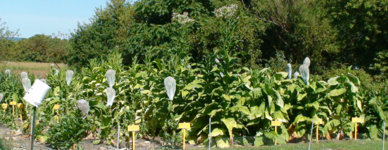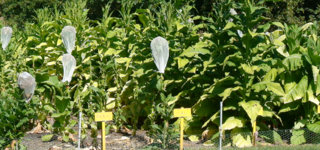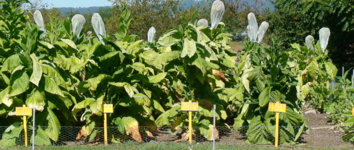AmaxB
Well-Known Member
Chemical Control
From - http://www.ipm.ucdavis.edu/PMG/PESTNOTES/pn7404.html Much more information here
When considering whether to apply insecticides for aphid control, remember that most larger plants can tolerate light to moderate levels of aphids with little damage. Larger aphid populations often rapidly decline due to biological control or when hot temperatures arrive. Often a forceful spray of water or water-soap solution, even on large street trees, when applied with appropriate equipment, will provide sufficient control.
If insecticides are needed, insecticidal soaps and oils are the best choices for most situations. Oils may include petroleum-based horticultural oils or plant-derived oils such as neem or canola oil. These products kill primarily by smothering the aphid, so thorough coverage of infested foliage is required. Apply these materials with a high volume of water, usually a 1 to 2% oil solution in water, and target the underside of leaves as well as the top. Soaps, neem oil, and horticultural oil kill only aphids present on the day they are sprayed, so applications may need to be repeated. Although these materials can kill some natural enemies that are present on the plant and hit by the spray, they leave no toxic residue so they don't kill natural enemies that migrate in after the spray.
These and other insecticides with contact-only activity are generally ineffective in preventing damage from aphids such as the leaf curl plum aphid or the woolly ash aphid, which are protected by galls or distorted foliage. Also, don't use soaps or oils on water-stressed plants or when the temperature exceeds 90°F. These materials may be phytotoxic to some plants, so check labels and test the materials on a portion of the foliage several days before applying a full treatment.
Supreme- or superior-type oils will kill overwintering eggs of aphids on fruit trees if applied as a delayed-dormant application just as eggs are beginning to hatch in early spring. (On plums dormant applications right after leaves have fallen in early November are preferred.) These treatments won't give complete control of aphids and probably aren't justified for aphid control alone but will also control soft scale insects if they are a problem. Common aphid species controlled with these types of oils include the woolly apple aphid, green apple aphid, rosy apple aphid, mealy plum aphid, and black cherry aphid.
Many other insecticides are available to control aphids in the home garden and landscape, including foliar-applied formulations of malathion, permethrin, and acephate (nonfood crops only). While these materials may kill higher numbers of aphids than soaps and oils, their use should be limited, because they also kill the natural enemies that provide long-term control of aphids and other pests, and they are associated with bee kills and environmental problems. Repeated applications of these materials may also result in resistance to the material.
Insecticides such as oils and soaps are also safer to use when children and pets may be present. Formulations combining insecticidal soaps and pyrethrins may provide slightly more knockdown than soaps alone yet have fewer negative impacts on natural enemies than malathion, permethrin, and acephate, because pyrethrins break down very quickly.
Systemic insecticides are also available for aphid management, primarily for woody ornamentals. These materials, including imidacloprid, are very effective and are especially useful for serious infestations of aphids such as the woolly hackberry aphid, which is often not effectively controlled by biological control or less toxic insecticides. Imidacloprid can have negative impacts on predators, parasitoids, and pollinators, so its use should be avoided where soaps and oils will provide adequate control. To protect pollinators, don't apply imidacloprid or other systemic insecticides to plants in bloom or prior to bloom.
Home-use soil-applied imidacloprid products are often diluted with water in a bucket and poured around the base of the tree or plant. Professional applicators can use soil injectors, which provide better control with less runoff potential. Applications are usually made in spring when aphids first become apparent.
Adequate rain or irrigation is required to move the product through the soil to the roots and up into large trees, and it may take several weeks to see an effect on aphids feeding on leaves. One application on hackberry is enough to control hackberry woolly aphid for two to three years.
From - http://www.ipm.ucdavis.edu/PMG/PESTNOTES/pn7404.html Much more information here
When considering whether to apply insecticides for aphid control, remember that most larger plants can tolerate light to moderate levels of aphids with little damage. Larger aphid populations often rapidly decline due to biological control or when hot temperatures arrive. Often a forceful spray of water or water-soap solution, even on large street trees, when applied with appropriate equipment, will provide sufficient control.
If insecticides are needed, insecticidal soaps and oils are the best choices for most situations. Oils may include petroleum-based horticultural oils or plant-derived oils such as neem or canola oil. These products kill primarily by smothering the aphid, so thorough coverage of infested foliage is required. Apply these materials with a high volume of water, usually a 1 to 2% oil solution in water, and target the underside of leaves as well as the top. Soaps, neem oil, and horticultural oil kill only aphids present on the day they are sprayed, so applications may need to be repeated. Although these materials can kill some natural enemies that are present on the plant and hit by the spray, they leave no toxic residue so they don't kill natural enemies that migrate in after the spray.
These and other insecticides with contact-only activity are generally ineffective in preventing damage from aphids such as the leaf curl plum aphid or the woolly ash aphid, which are protected by galls or distorted foliage. Also, don't use soaps or oils on water-stressed plants or when the temperature exceeds 90°F. These materials may be phytotoxic to some plants, so check labels and test the materials on a portion of the foliage several days before applying a full treatment.
Supreme- or superior-type oils will kill overwintering eggs of aphids on fruit trees if applied as a delayed-dormant application just as eggs are beginning to hatch in early spring. (On plums dormant applications right after leaves have fallen in early November are preferred.) These treatments won't give complete control of aphids and probably aren't justified for aphid control alone but will also control soft scale insects if they are a problem. Common aphid species controlled with these types of oils include the woolly apple aphid, green apple aphid, rosy apple aphid, mealy plum aphid, and black cherry aphid.
Many other insecticides are available to control aphids in the home garden and landscape, including foliar-applied formulations of malathion, permethrin, and acephate (nonfood crops only). While these materials may kill higher numbers of aphids than soaps and oils, their use should be limited, because they also kill the natural enemies that provide long-term control of aphids and other pests, and they are associated with bee kills and environmental problems. Repeated applications of these materials may also result in resistance to the material.
Insecticides such as oils and soaps are also safer to use when children and pets may be present. Formulations combining insecticidal soaps and pyrethrins may provide slightly more knockdown than soaps alone yet have fewer negative impacts on natural enemies than malathion, permethrin, and acephate, because pyrethrins break down very quickly.
Systemic insecticides are also available for aphid management, primarily for woody ornamentals. These materials, including imidacloprid, are very effective and are especially useful for serious infestations of aphids such as the woolly hackberry aphid, which is often not effectively controlled by biological control or less toxic insecticides. Imidacloprid can have negative impacts on predators, parasitoids, and pollinators, so its use should be avoided where soaps and oils will provide adequate control. To protect pollinators, don't apply imidacloprid or other systemic insecticides to plants in bloom or prior to bloom.
Home-use soil-applied imidacloprid products are often diluted with water in a bucket and poured around the base of the tree or plant. Professional applicators can use soil injectors, which provide better control with less runoff potential. Applications are usually made in spring when aphids first become apparent.
Adequate rain or irrigation is required to move the product through the soil to the roots and up into large trees, and it may take several weeks to see an effect on aphids feeding on leaves. One application on hackberry is enough to control hackberry woolly aphid for two to three years.





